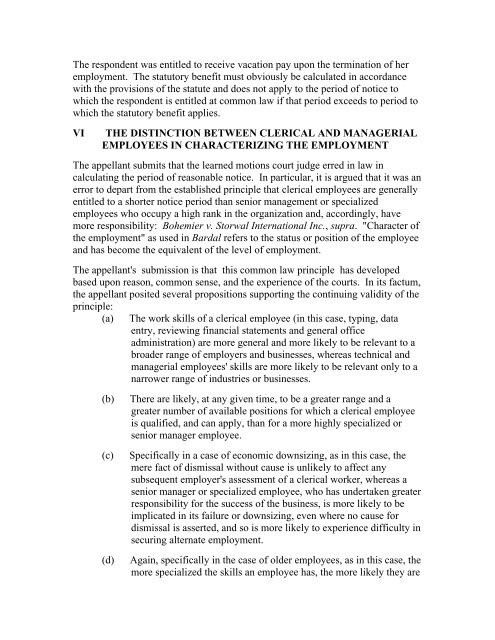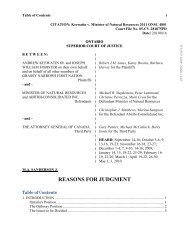Cronk v. Canadian General Insurance Co., 1995 CanLII 814 (ON CA)
Cronk v. Canadian General Insurance Co., 1995 CanLII 814 (ON CA)
Cronk v. Canadian General Insurance Co., 1995 CanLII 814 (ON CA)
Create successful ePaper yourself
Turn your PDF publications into a flip-book with our unique Google optimized e-Paper software.
The respondent was entitled to receive vacation pay upon the termination of her<br />
employment. The statutory benefit must obviously be calculated in accordance<br />
with the provisions of the statute and does not apply to the period of notice to<br />
which the respondent is entitled at common law if that period exceeds to period to<br />
which the statutory benefit applies.<br />
VI<br />
THE DISTINCTI<strong>ON</strong> BETWEEN CLERI<strong>CA</strong>L AND MANAGERIAL<br />
EMPLOYEES IN CHARACTERIZING THE EMPLOYMENT<br />
The appellant submits that the learned motions court judge erred in law in<br />
calculating the period of reasonable notice. In particular, it is argued that it was an<br />
error to depart from the established principle that clerical employees are generally<br />
entitled to a shorter notice period than senior management or specialized<br />
employees who occupy a high rank in the organization and, accordingly, have<br />
more responsibility: Bohemier v. Storwal International Inc., supra. "Character of<br />
the employment" as used in Bardal refers to the status or position of the employee<br />
and has become the equivalent of the level of employment.<br />
The appellant's submission is that this common law principle has developed<br />
based upon reason, common sense, and the experience of the courts. In its factum,<br />
the appellant posited several propositions supporting the continuing validity of the<br />
principle:<br />
(a)<br />
The work skills of a clerical employee (in this case, typing, data<br />
entry, reviewing financial statements and general office<br />
administration) are more general and more likely to be relevant to a<br />
broader range of employers and businesses, whereas technical and<br />
managerial employees' skills are more likely to be relevant only to a<br />
narrower range of industries or businesses.<br />
(b)<br />
(c)<br />
(d)<br />
There are likely, at any given time, to be a greater range and a<br />
greater number of available positions for which a clerical employee<br />
is qualified, and can apply, than for a more highly specialized or<br />
senior manager employee.<br />
Specifically in a case of economic downsizing, as in this case, the<br />
mere fact of dismissal without cause is unlikely to affect any<br />
subsequent employer's assessment of a clerical worker, whereas a<br />
senior manager or specialized employee, who has undertaken greater<br />
responsibility for the success of the business, is more likely to be<br />
implicated in its failure or downsizing, even where no cause for<br />
dismissal is asserted, and so is more likely to experience difficulty in<br />
securing alternate employment.<br />
Again, specifically in the case of older employees, as in this case, the<br />
more specialized the skills an employee has, the more likely they are
















